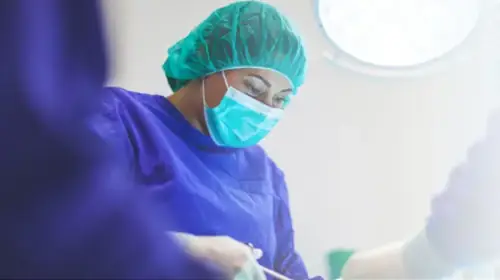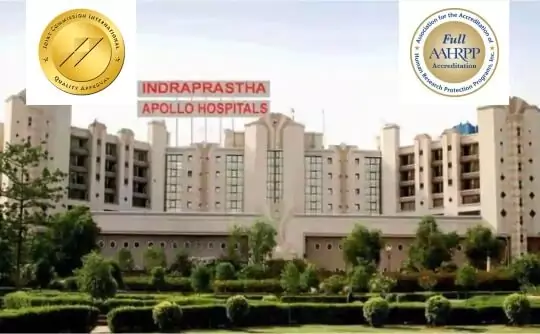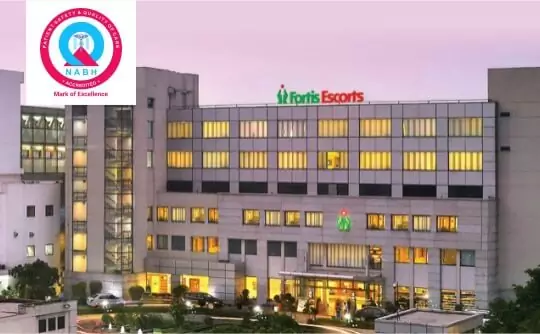

The Ventricular Septal Defect Treatment Cost in India starts from USD 4,500. It varies depending on the patient's medical condition, medical history, the surgeon, the facility, and the city in India where you choose to get the surgery done.
The cost for ventricular septal defect treatment quoted in India above is indicative and should not be taken as the final cost of the surgery. The final cost can be ascertained after the surgeon in India has physically evaluated the patient. The cost in Indian Rupees can vary based on the exchange rate.
A significant component of the Ventricular Septal Defect Treatment Cost in India is the heart surgeon's fees. IndiCure Health Tours recommends highly experienced, skilled, board-certified heart surgeons in India who can deliver excellent results. While the charges may vary based on the surgeon's experience, you can be confident that you are in safe and capable hands when opting for affordable heart surgery in India with IndiCure Health Tours.
In the pursuit of enhancing patient care, the medical field continually introduces new techniques and technologies into surgical procedures. These innovative advancements are designed to improve outcomes, reduce recovery times, and increase the overall effectiveness of treatments. While these advancements can significantly benefit patient care, they may also lead to higher Ventricular Septal Defect Treatment Cost in India.
Selecting an accredited medical facility with skilled and qualified medical staff is essential for the success of your Ventricular Septal Defect (VSD) Treatment in India. Larger cities in India generally provide superior medical facilities and more experienced surgeons, leading to higher costs. IndiCure Health Tours recommends surgical facilities in these larger cities in India to prioritize quality of care and ensure safety of our international patient guests.
The surgery-related expenses include the pre- and post-surgical expenses. The pre-surgical expenses are associated with the age and medical condition of the patient and thus the number and type of investigations required. Post-surgical expenses may include prescription medications and follow-up consultations.
At IndiCure Health Tours, we consolidate most of the expenses for your Ventricular Septal Defect (VSD) Treatment in India to provide an inclusive and cost-effective package tailored to your budget and individual requirements. After receiving medical reports, your Case Manager will provide an estimated cost based on a discussion with the heart surgeon in India.
The final Ventricular Septal Defect (VSD) Treatment cost in India can however be confirmed after your face-to-face consultation with the heart surgeon in India.

We Help you Choose the Right Treatment, Surgeon & Hospital

We Arrange Video/Telephonic Consultation with the Surgeon

We Assist you with Visa & Accommodation

We Receive you at the Airport and Drop you at Hotel/Hospital

We Assist you the at Hospital & Provide Post Operative Support
IndiCure Health Tours offers exclusive savings on your medical travel to India. We partner with the best hospitals in India to negotiate special rates, ensuring you get the best prices when you plan your medical travel with us.

Here is a set of questions you should consider asking before commencing your medical journey for Ventricular Septal Defect (VSD) Treatment in India.
Prepare to answer questions about your:
A hole in the heart, known as a ventricular septal defect (VSD), is a common birth abnormality (congenital). The hole (defect) is in the septum, which separates the heart's lower chambers (ventricles) and permits blood to flow from the left to the right side. The oxygen-rich blood is then pumped back to the lungs rather than out to the body, putting more strain on the heart.
A tiny ventricular septal defect may not cause any issues, and many VSDs close on their own. VSDs that are medium or bigger may require surgical treatment early in life to avoid problems.
Signs and symptoms of serious heart defects often appear during the first few days, weeks, or months of a child's life.
Symptoms of a Ventricular Septal Defect (VSD) in a baby include:
A ventricular septal defect may go undetected by you and your doctor at birth. Symptoms may not develop until later in childhood, if at all, if the abnormality is minor. The signs and symptoms vary depending on the size of the hole and any other cardiac abnormalities that may be present.
If your doctor hears a murmur while listening to your baby's heart with a stethoscope during a routine visit, he or she may suspect a heart abnormality. A VSD may not be diagnosed until a person reaches maturity.
Problems early in the heart's development produce congenital cardiac abnormalities, but there's often no definite cause. Environmental and genetic factors may both play a role. VSDs can occur on their own or in conjunction with other congenital cardiac abnormalities.
Surgical correction is typically done on babies in their first year. Children and adults with a medium or large ventricular septal defect, or one that is causing symptoms, may require surgery to close the defect.
The surgical process begins with the patient being placed under general anesthesia. The surgeon then makes an incision in the chest to access the heart. This approach allows the surgeon to have a clear and direct view of the ventricular septum.
Once the heart is exposed, the surgeon repairs the hole in one of two ways: Primary Repair: In some cases, the surgeon stitches the hole directly using sutures. This method is typically used for smaller defects. For larger holes, the surgeon uses a mesh cloth patch.
Over time, the body's natural tissue growth processes take over. The heart tissue grows around and over the patch, eventually absorbing it into the muscle. This effectively closes the defect and restores normal heart function.
Your child will be admitted to the intensive care unit (ICU) right after the procedure. To keep your child as comfortable as possible, pain medication and sedatives will be administered. Most kids can resume their typical activities after 1-2 months of the procedure.
Adults who have closed VSDs and no other heart or lung problems should expect to live a normal life. Only 6% of patients have undergone a re-operation to plug minor leaks that occurred around the patch in the 40 years after the surgery has been extensively used for VSD treatment.

New Delhi
Indraprastha Apollo Hospitals, New Delhi is a state of the art multi speciality tertiary-care hospital situated in the most posh area of South Delhi. Considered to be the flagship hospital of Apollo group, Indraprastha Apollo Hospital is one of the important landmarks not only in Delhi, but in the world map because of its popularity among the medical tourists. The hospital has been one of the most sought after medical institutions for patients from Asia Pacific and beyond.

New Delhi
Fortis Escorts Heart Institute and Research Centre is one of the most revered medical institutions not only in India, but the entire world. The institute has set benchmarks in cardiac care with path-breaking work over the last 25 plus years. The hospital has the most advanced technology and has seen the best outcomes even in the most complex cardiac cases; be it cardiac surgery, Interventional Cardiology, Pediatric Cardiology, Pediatric Cardiac Surgery or Non-invasive Cardiology
VSD is most commonly caused by a congenital heart defect, or a birth defect. When the muscle wall (septum) between the left and right sides of the heart is not adequately formed during the fetal period, a ventricular septal defect develops.
A hole in the septum between the two ventricle chambers of the heart results from the baby's inadequate cardiac development. VSD can also occur later in life, usually as a result of a chest trauma, a heart attack, or as a consequence after certain cardiac surgeries.
There are four different forms of Ventricular Septal Defects:
Membranous VSD: The opening is near the aortic and tricuspid valves in the upper ventricular septum. This does not close on its own, and surgery is frequently required.
Muscular VSD: An opening in the lower ventricular septum's muscular part that may close on its own. It's possible that surgery isn't required.
Ventricular septal defect (VSD) of the atrioventricular canal type occurs near the tricuspid and mitral valves. Repair generally necessitates surgical intervention.
The most uncommon kind of VSD is conal septal VSD, which occurs right below the pulmonary valve.
The following are the procedures for treating VSD in India:
Surgical Repair: An open heart surgery is performed under general anaesthesia in this treatment. The surgeon makes an incision in the chest and closes the VSD hole with stitches or a patch.
Catheter Repair: The surgeon inserts a tiny tube into a blood vessel through the groin and guides it to the heart during a catheterization operation. The VSD opening is closed with a mesh device, and the treatment does not require opening the chest.
Hybrid Repair: A hybrid procedure combines surgical and catheter procedures. A small incision is made to gain access to the heart, and the patient is supported by a heart-lung machine throughout the treatment. The VSD is closed with a mesh device after the surgeon inserts a catheter tube through the tiny incision. Medications are also administered to help manage the symptoms and avoid problems.
Pediatric cardiologists and Pediatric Cardiac Surgeons are medical doctors who specialize in the treatment of cardiac issues in children and adolescents.
Ventricular septal defect (VSD) surgery is recommended when the VSD is large in size, causing symptoms and problems or affecting the growth and development of the child.
VSD repair surgery has been shown to be more successful when performed on a child when he or she is between the ages of one and three. When surgery is essential, such as when the hole is large or affects the heart or lungs, it is normally recommended to have it done during the first year of a child's life.
When a VSD defect is big, oxygenated blood is pushed back to the lungs, forcing the heart to work harder and putting too much strain on the lungs. This can cause a variety of issues, ranging from minor to possibly fatal.
Cardiac failure, pulmonary hypertension (high pressure on lung arteries), endocarditis (heart infection), and heart valve issues are all possible consequences. To avoid such life-threatening complications, the problem must be addressed as soon as possible.
A modest VSD (with a diameter of less than or equal to 3 mm) may close on its own and require no treatment. In cases when the VSD is large (more than 6 mm) or medium (3-6 mm), surgical treatments or medicinal management are required to rectify the defect.
It's also crucial to remember that while medications can't shrink the VSD or make it close any faster than it would naturally, they can help control the symptoms and problems.
Apart from the surgery cost in India for Ventricular Septal Defect Treatment, there are additional expenses to consider when planning your medical trip to India. This includes budgeting for accommodation before and after hospital stay, meals, airfare costs, ground transportation expenses while in India, such as taxi fares or rental car.
By carefully considering these additional expenses alongside the medical cost for Ventricular Septal Defect Treatment in India, you can better plan and budget for your medical trip to India, ensuring a smooth and comfortable experience during your medical tour.
Years of Experience
Happy Clients
Countries Patient Treated
Most Affordable Price
Enhance your medical journey to India by availing these extra services.
Traveling abroad for medical reasons may be challenging. With our experience of over a decade and working with the best surgeons and top hospitals in India, we help make your medical tour easier and safer for you. We will guide you at every step of the way and make end-to-end arrangements for your surgery, travel, and stay.
Ramandeep Dhaliwal
I had great experience having rhinoplasty through Indicure. Dr. Ruchika from Indicure has helped me in finding best plastic surgeon, answering all my questions...
Read More
Joshua Archer
My name is Joshua Archer I'm from New Zealand, bay of plenty, kawerau I opted for the bypass surgery in January 2023 but planned it in advance for 28 September found IndiCure...
Read More
Kera Ren
Absolutely loved my experience with IndiCure - from first inquiring to meeting the surgeon pre op to my follow up post op. The surgeon was extremely approachable...
Read More
Andreana Paul
Had a wonderful experience. Visited India for my plastic surgery. From sending mails, airport pickup, comfortable accommodation and, to smooth hospital appointment booking...
Read More
Brandi Luce
I had the privilege of using Indicure's services for a cosmetic procedure that I had wanted for a long time but had always been apprehensive about. Ruchika helped me...
Read More
Jade M
Indicure Health Tours went above and beyond my expectations. They helped me with every aspect of my journey and were professional, kind and caring. I was...
Read More
The content on the website (www.indicure.com) is intended to be general information and is provided only as a service. All photographs on our website of before and after results are examples only, and do not constitute an implied or any other kind of certainty for the result of surgery.
Learn about IndiCure Health Tours' comprehensive editorial policy that strives to deliver trustworthy, helpful, relevant, accurate and people-first content on medical tourism in India.
It is not medical advice and should not be taken as medical advice. It should not be used to diagnose or treat a health condition and is in no way meant to be a substitute for professional medical care. You are advised to see a surgeon in person to assess what surgery may or may not accomplish for you.
It is also important to keep your expectations realistic and to understand that all surgical procedures carry risks and should never be taken lightly.